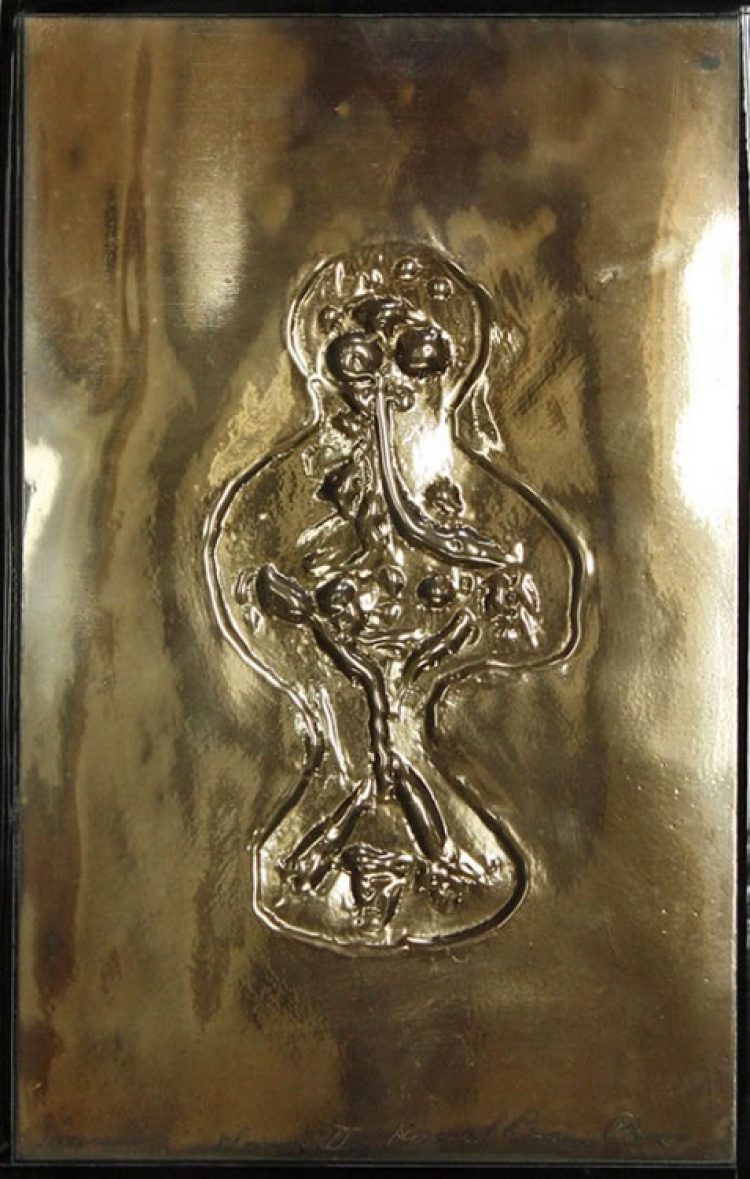
About this Work
About the Artist
American
b. 1925 Long Island, New York
d. 1979 El Cerrito, CaliforniaHarold Persico Paris produced haunting imagery from diverse and innovative media. He was born in Long Island, New York on August 6, 1925. As a youth Paris was allowed to work behind the scenes at the Yiddish theatre where his father was an actor, applying the makeup which transformed the actors. This early dramatic influence remained with the artist, showing up later in his costumes, his flair, his personality, and the personal drama, tension, and inventiveness of his media and his imagery.Paris studied in America and Europe but remained an outsider, eschewing the art centers as well as the movements. He studied briefly at Atelier 17 and the Creative Lithographic Workshop in New York. Awarded the Louis Comfort Tiffany Fellowship, the John Simon Guggenheim Fellowship, and the Fulbright Fellowship, he applied these to realizing goals in graphics, painting and casting. He lived in Madrid while guest instructing at the Academia de San Fernando and in Munich while studying casting at the Akademie der Bildenden Kunst.As a correspondent for Stars and Stripes during World War II, Paris witnessed the death camps at Buchenwald. Profoundly affected, his personal torment underlies his imagery. There are Semitic references in his imagery and titles but the iconography is personal, unique, and defies categorization. He began his Buchenwald series of graphics in 1945.Paris moved to California between 1960-1961. At the age of thirty-five, he became Assistant Professor of Art at University of California, Berkeley and was promoted to full Professor in 1972. During these seminal years he continued to explore the new medium of plastic and expand upon the use of ceramics by developing means to strengthen and support ceramic walls and rooms. He co-founded a bronze foundry in Berkeley and developed techniques of welding and casting, thought impossible by others.Paris’ work is represented in the Art Institute of Chicago, the Achenbach Foundation for Graphic Art, the Hirshhorn Museum, the Judah L. Magnus Museum, the Library of Congress, the Museum of Modern Art in New York and San Francisco, the National Gallery of Art, the Oakland Museum of California, the Philadelphia Museum, and the Whitney Museum of American Art.
b. 1925 Long Island, New York
d. 1979 El Cerrito, CaliforniaHarold Persico Paris produced haunting imagery from diverse and innovative media. He was born in Long Island, New York on August 6, 1925. As a youth Paris was allowed to work behind the scenes at the Yiddish theatre where his father was an actor, applying the makeup which transformed the actors. This early dramatic influence remained with the artist, showing up later in his costumes, his flair, his personality, and the personal drama, tension, and inventiveness of his media and his imagery.Paris studied in America and Europe but remained an outsider, eschewing the art centers as well as the movements. He studied briefly at Atelier 17 and the Creative Lithographic Workshop in New York. Awarded the Louis Comfort Tiffany Fellowship, the John Simon Guggenheim Fellowship, and the Fulbright Fellowship, he applied these to realizing goals in graphics, painting and casting. He lived in Madrid while guest instructing at the Academia de San Fernando and in Munich while studying casting at the Akademie der Bildenden Kunst.As a correspondent for Stars and Stripes during World War II, Paris witnessed the death camps at Buchenwald. Profoundly affected, his personal torment underlies his imagery. There are Semitic references in his imagery and titles but the iconography is personal, unique, and defies categorization. He began his Buchenwald series of graphics in 1945.Paris moved to California between 1960-1961. At the age of thirty-five, he became Assistant Professor of Art at University of California, Berkeley and was promoted to full Professor in 1972. During these seminal years he continued to explore the new medium of plastic and expand upon the use of ceramics by developing means to strengthen and support ceramic walls and rooms. He co-founded a bronze foundry in Berkeley and developed techniques of welding and casting, thought impossible by others.Paris’ work is represented in the Art Institute of Chicago, the Achenbach Foundation for Graphic Art, the Hirshhorn Museum, the Judah L. Magnus Museum, the Library of Congress, the Museum of Modern Art in New York and San Francisco, the National Gallery of Art, the Oakland Museum of California, the Philadelphia Museum, and the Whitney Museum of American Art.
